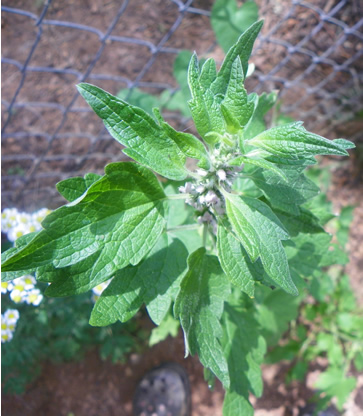Motherwort Leonurus caridica L.

Leonurus cardiaca beginning to bloom
- Common Names
- Motherwort , Lion's tail, lion's ear
- Botanical Name
- Leonurus caridica L.
- Family
- LAMIACEAE
Medicinal Uses & Benefits of Motherwort
![]() How to Use|
Side Effects |
Plant & Garden|
How to Use|
Side Effects |
Plant & Garden|
- Medicinal Uses: * Amenorrhea
* Cardiovascular
* Chinese
* Cholesterol
* Dysmenorrhea
* Female Hormones
* Herbal Teas
* Hypertension
* Longevity Tonics
* PMS
- Properties: * Antispasmodic * Anxiety * Aromatic * Astringent * Calm * Cordial * Diaphoretic * Diuretic * Emmenagogue * Nervine * Parturient
- Parts Used: Aerial parts
- Constituents: alkaloids (including leonurinine and stachydrine), bitter glycosides (leonurine and leonuridin), tannins, a volatile oil, vitamin a
How to Use: Motherwort
“There is no better herb to take melancholy vapours from the heart, to strengthen it, and make a merry, chearful blithe soul than this herb. ”
Nicholas Culpeper
Chinese motherwort, known as yi-mu-cao, and the common European motherwort serve as excellent examples of plants used for parallel purposes by divergent cultures, whose uses are confirmed by modern research. This fascinating but still little-appreciated member of the mint family deserves greater attention in the West. In TCM motherwort was used to promote longevity and strengthen the heart, just as western herbal medicine considers motherwort to be one of the best heart tonics. Motherwort is used to promote blood circulation, lower cholesterol, slow a too rapid heart rate, and relieve stress on the heart muscle. (Duke,James, Ph.D.) It also is diuretic, and reduces swelling, helping to lower blood pressure. These medicinal actions are confirmed by science to be linked to the bitter glycosides as well as other phytochemicals that motherwort contains. (Foster, Steven and Yue "Herbal Emissaries") Motherwort ia approved for use in nervous cardiac disorders and as adjuvant for thyroid hyperfunction by the German Commision E. Commission E Monographs
Motherwort is also one of the best tonic herbs for women. Motherwort is especially valuable in a wide range of female disorders (hence the name), allaying nervous irritability and inducing quiet and passivity of the whole nervous system. I find motherwort a good remedy for those times when you feel a generalized anxiety without any clear cut cause. The herb regulates the menses, and is a strong emmenagogue, helping to stimulate delayed periods and is an excellent remedy for menstrual cramps especially those accompanied by scanty menses. The combination of motherwort with scullcap and/or valerian can help to relieve pain and stress associated with childbirth. (Gladstar, Rosemary)
Preparation Methods & Dosage :Motherwort is available in capsule and extract form, but is most useful taken as a tea. The somewhat bitter taste can be mellowed by adding spices or sweeter tasting herbs. Frequently combined with hawthorn for heart tonics.
Motherwort Remedies
Traditional Chinese Medicine
 Li Shi-zhen lists the uses of the seeds and herb in the 1596 Ben Cao Gang Mu. He noted that it helped to stimulate circulation, benefit the eyes, quiet the nerves, and regulate the menses, among other uses.
4
Li Shi-zhen lists the uses of the seeds and herb in the 1596 Ben Cao Gang Mu. He noted that it helped to stimulate circulation, benefit the eyes, quiet the nerves, and regulate the menses, among other uses.
4
Motherwort Side Effects: Motherwort contains alkaloid stachydrine. Because of its ability to stimulate uterine contractions, it is not recommended during pregnancy, except during the last few days, when it is used to stimulate labor.
Plant Description

Motherwort flowers
- Flowers:Dull purple pink, pale purple, or white, small, clustered in axils of upper leaves. Calyx tubular, bell-shaped, with 5 rigid awl-like teeth; corolla 2-lipped, upper lip arched, woolly without; lower lip 3-lobed, spreading, mottled; the tube with oblique ring of hairs inside. Four twin-like stamens, anterior pair longer, reaching under upper lip; style 2-cleft at summit.
- Stem: 2 to 5 ft. tall, straight, branched, leafy, purplish.
- Leaves:Opposite, on slender petioles; lower ones rounded, 2 to 4 in. broad, palmately cut into 2 to 5 lobes; upper leaves narrower, 3-cleft or 3-toothed.
- Fruit:
- Preferred Habitat:Waste places near dwellings.
- Flowering Season:June - September
- Distribution:Nova Scotia southward to North Carolina, west to Minnesota and Nebraska. Naturalized from Europe and Asia.
How the bees love this generous, old-fashioned entertainer! One nearly always sees them clinging to the close whorls of flowers that are strung along the stem, and of course transferring pollen, in recompense, as they journey on.
Regional Traditions :Traditional Chinese Medicine *
How to Grow Motherwort
Perennial, self seeds generously. Full sun. Harvest when flowers in mid to late summer. Active chemical components are at their highest concentrations when the plant is in bloom.
Related Species
Leonurus sibericus, Chinese motherwort
Leonotis leonurus also known as Lion's Tail or Wild Dagga











